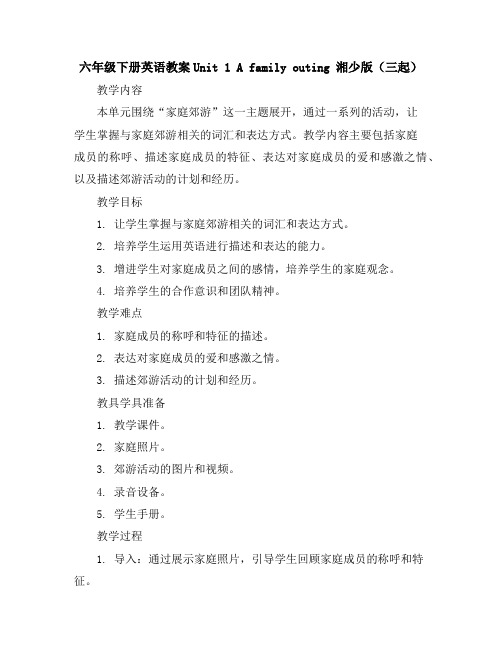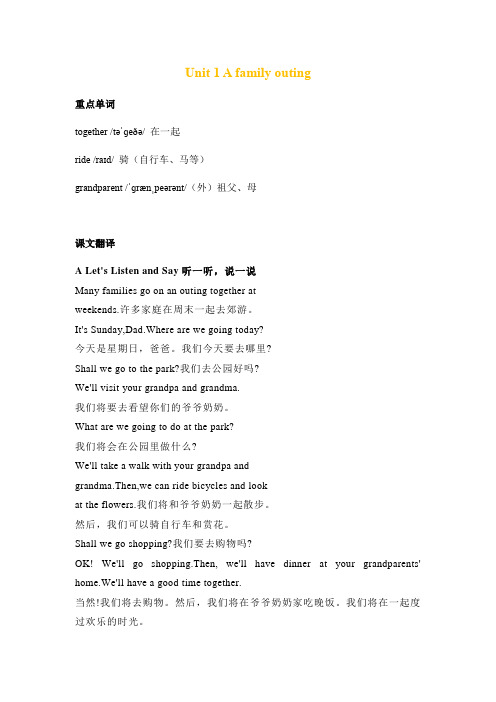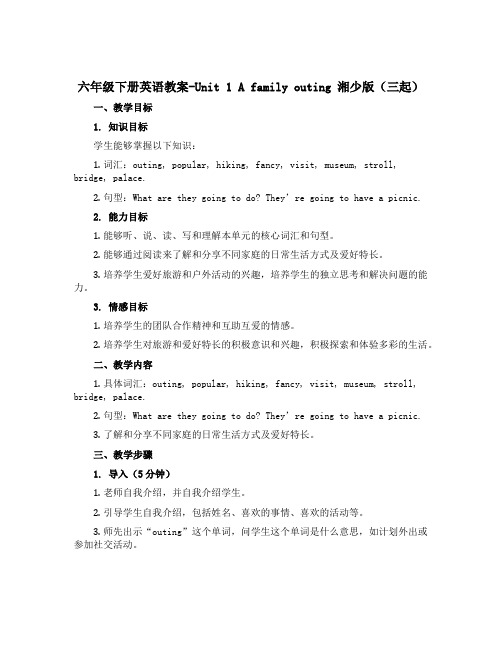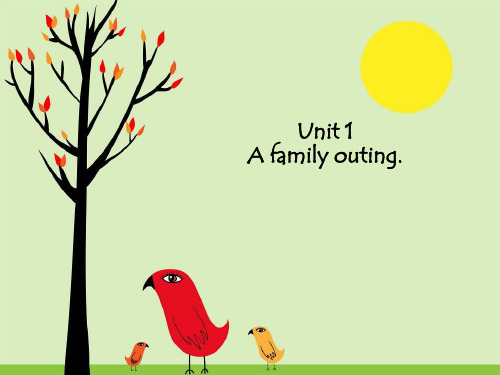Unit 1 A family outing
湘少版六年级英语下册unit1 a family outingppt课件

A. the park
B the beach
C. grandparents’ home D.Liu’s daughter like to do on the beach?
A. eat ice cream b. fly a kite
c. have a picnic D. play games
Relax on the beach在 沙滩放松
Surf 冲浪
17
1. At the weekends, many families ____________.
A. go to school B. go shopping
C. go on an outing
2. Where does Mr Liu like to take his family to?
4
Visit grandparents
It is happy to do all the things together with family.
5
Watch a movie. See a film.
Go shopoing.
6
Take a walk. Have a walk.
Look at the flowers.
23
此课件下载可自行编辑修改,供参考! 感谢您的支持,我们努力做得更好!
六年级下册英语教案-Unit1Afamilyouting湘少版(三起)

六年级下册英语教案Unit 1 A family outing 湘少版(三起)教学内容本单元围绕“家庭郊游”这一主题展开,通过一系列的活动,让学生掌握与家庭郊游相关的词汇和表达方式。
教学内容主要包括家庭成员的称呼、描述家庭成员的特征、表达对家庭成员的爱和感激之情、以及描述郊游活动的计划和经历。
教学目标1. 让学生掌握与家庭郊游相关的词汇和表达方式。
2. 培养学生运用英语进行描述和表达的能力。
3. 增进学生对家庭成员之间的感情,培养学生的家庭观念。
4. 培养学生的合作意识和团队精神。
教学难点1. 家庭成员的称呼和特征的描述。
2. 表达对家庭成员的爱和感激之情。
3. 描述郊游活动的计划和经历。
教具学具准备1. 教学课件。
2. 家庭照片。
3. 郊游活动的图片和视频。
4. 录音设备。
5. 学生手册。
教学过程1. 导入:通过展示家庭照片,引导学生回顾家庭成员的称呼和特征。
2. 新课呈现:通过教学课件,呈现与家庭郊游相关的词汇和表达方式。
3. 练习:学生分组进行角色扮演,模拟家庭郊游的场景,运用所学知识进行交流。
5. 作业布置:学生完成课后练习,巩固所学知识。
板书设计1. 家庭成员的称呼和特征。
2. 家庭郊游的相关词汇和表达方式。
3. 描述家庭成员的爱和感激之情的表达方式。
4. 描述郊游活动的计划和经历的表达方式。
作业设计1. 完成课后练习,巩固所学知识。
2. 写一篇关于家庭郊游的短文,运用所学知识进行描述。
课后反思1. 教学内容是否充实,学生是否掌握了重点知识。
2. 教学方法是否有效,学生是否积极参与。
3. 教学目标是否达成,学生是否能够运用所学知识进行交流。
4. 教学难点是否得到解决,学生是否能够正确描述家庭成员的特征和表达对家庭成员的爱和感激之情。
5. 教学过程中是否存在问题,如何改进。
教学难点详细补充和说明家庭成员的称呼和特征的描述家庭成员称呼:在英语中,家庭成员的称呼与中文有所不同,例如“堂兄”在英语中是“cousin”。
Unit1 A family outing. (教案)-2022-2023学年英语六年级下册

Unit1 A family outing.教学目标1.能够听懂、会说关于家庭出游的一些日常用语。
2.能够用简单句型描述家庭出游的过程和体验。
3.能够理解并运用本单元所学的重点词汇。
教学重点1.本单元所学的日常用语。
2.本单元所学的重点词汇。
3.学生能够运用简单的句型描述家庭出游的过程和体验。
教学难点1.能够听懂、会说本单元重点词汇。
2.能够熟练运用所学词汇描述家庭出游的过程和体验。
教学准备1.教师准备教案、课件、黑板、彩笔等。
2.学生准备听力材料、笔记本等。
教学过程Part 1: 呈现1.教师用图片呈现一张家庭出游的照片,让学生自由想象。
2.教师出示一些日常用语,例如:“我们去哪里?”、“我要玩这个。
”等。
Part 2: 听力训练教师出示听力材料,学生听取材料并回答问题。
Task 1听力材料:(1)W:我们去哪里玩?M:我们去公园玩吧。
(2)W:我想见见海,可以吗?M:好啊,我们去海边玩吧。
问题:1.学生们去哪里玩?2.学生们能否去海边玩?Task 2听力材料:(1)W:你要玩滑梯吗?M:好的,我要玩滑梯。
(2)W:今天的红色过山车好好玩啊!M:是啊,我也觉得很好玩。
问题:1.学生想玩什么?2.学生觉得今天的什么好玩?Part 3: 学习词汇1.教师出示本单元所学的重点词汇,并讲解它们的意思和用法。
2.学生们跟着老师一起读词汇,并举一两个例子来运用所学词汇。
Part 4: 口语训练1.学生们分组进行口语练习,描述家庭出游的过程和体验。
2.教师根据学生的表现给予反馈和指导。
Part 5: 课堂练习教师出示课堂练习题,并引导学生做题。
Exercise 1填空。
1.M:我们去公园___吧。
2.W:我想见见___,可以吗?3.M:好啊,我们去___玩吧。
4.W:你要玩___吗?5.M:是啊,我也觉得今天的___好好玩啊!Exercise 2选择。
1.下面哪个单词与“出游”意思相近? A. 旅行 B. 工作 C. 练习2.“我们去哪里玩?”用英语怎么说? A. Where do we go to have fun? B. Where do we go shopping? C. Where do we go to work?Exercise 3写作。
湘少版六下unit 1A family outing

Fill in the blanks.
They have a walk ________________.
Fill in the blanks.
Girls like to _g_o__s_h_o__p_p_i_n_g_____ .
Fill in the blanks.
They go on a _f_a_m__il_y_o__u_t_in_g_____ .
Unit 1 A family outing
Period 1
学习目标
学习together, ride, grandparent 等单词和watch a movie, go shopping等动词短语; 学习并掌握情态动词“shall”的用 法、掌握一般现在时和一般将来时 的用法;
锻炼敢于用英语交流的勇气。
锻炼敢于用英语交流的勇气。
Lead-in
Free talk
Last weekend, some of my friends had a great time. Let's look at the ping?
They are looking at the flowers.
Let's go shopping. 我们去购物吧。
Let's Learn
We like to take a walk in the morning.
我们喜欢早上散步。
Let's Learn
They look at the flowers in the park.
Say them fast!
Fill in the blanks.
He iswatching a movie _________________ .
湘少版unit1 a family outing课文

我们一家和我的祖父母去饭店吃午餐。
At weekends,many families go on an outing.
Some go to the parks. Some go to the
shopping centres.
中心
在周末,许多家庭去郊游。一些(家庭)去公园。 一些(家庭)去购物中心。
My family watches a movie together.
看电影 一起
我们一家一起看电影。
My family goes to the library.
图书馆
我们一家去图书馆。
My family goes to the restaurant for
餐馆,饭店 吃
lunch with my grandparents.
(×) 3. Mr Liu’s daughter doesn’t like to play on the
beach.
(√) 4. Mrs Liu brings food and drinks. (√) 5. They love each other more.
They enjoy the day there. They like to swim in
在
the sea and relax on the sandy beach.
海里 放松 沙滩
他们在那里度过愉快的一天。他们喜欢在海里 游泳,在沙滩上放松心情。
sandy:英 [‘sændɪ]
there:英 [ðeə; ðə] here:英 [hɪə]
They have lots of fun and they love each other
许多乐趣 彼此,互相
more.
Unit 1 a family outing

take/have a walk
ride bicycles
go on an outing 郊游
look at the flowers
go shopping
have dinner together
一般过去式:过去发生的事。 小学常见时间状语: yesterday、last year/month/week/night…
Where did your family go last weekend?
My family went to the beach/ zoo/ museum last weekend.
What did you do last Sunday?
I learnt dancing last Sunday. We went on an outing and had a picnic.
1.How many people are there in the family? There are ( six ). 2.Who are they? They are ( Lingling,Dongdong, parents and grandparents ) 3.What will they do at weekends?
一般现在时:经常、反复发生的行为及现在的某种状 况. 频率副词:sometimes. often. always. never
Where does your family often go at weekends? My family often goes to the library. What does your sister always do at weekends? She always does her homework and plays the piano.
六年级下册英语教案-Unit1Afamilyouting第一课时-湘少版

六年级下册英语教案Unit 1 A family outing 第一课时湘少版教学内容本节课主要围绕湘少版六年级下册英语教材Unit 1 "A family outing"展开。
教学内容包括阅读理解、词汇学习、语法应用、口语表达和文化背景介绍。
通过学习,学生将能够理解并运用与家庭郊游相关的词汇和表达,同时提高阅读理解和口语表达能力。
教学目标1. 知识与技能:学生能够掌握与家庭郊游相关的词汇和表达,如“picnic”, “outing”, “camping”等。
2. 过程与方法:通过小组讨论、角色扮演等活动,提高学生的英语口语表达能力和合作学习能力。
3. 情感态度价值观:培养学生对家庭活动的热爱和对自然环境的保护意识。
教学难点1. 词汇记忆:本单元涉及多个新词汇,学生需要通过多种记忆方法来加强记忆。
2. 语法应用:正确使用一般过去时态描述过去发生的事情。
教具学具准备1. 教材:湘少版六年级下册英语教材。
2. 多媒体:PPT展示、音频播放设备。
3. 辅助材料:词汇卡片、角色扮演道具。
教学过程1. 导入:通过展示一些家庭郊游的照片,激发学生的学习兴趣。
2. 新授:介绍新词汇和表达,通过实物展示、图片等辅助教学。
3. 练习:小组合作练习对话,角色扮演。
4. 巩固:通过游戏、竞赛等形式巩固新学词汇和表达。
板书设计1. Unit 1 A family outing2. 关键词汇:列出本节课的重点词汇。
3. 语法点:一般过去时态的构成和应用。
4. 活动安排:展示本节课的主要活动。
作业设计1. 书面作业:完成教材上的相关练习题。
2. 口头作业:与家长进行关于家庭郊游的英语对话。
3. 扩展作业:查找关于家庭活动的英语文章,下节课分享。
课后反思本节课通过多种教学方法,使学生能够积极参与并有效学习。
但在词汇记忆和语法应用方面,部分学生仍存在困难。
在今后的教学中,应更加注重个体差异,提供更多针对性的辅导和练习。
六年级英语下册素材-Unit 1 A family outing课文翻译 湘少版(三起)

Unit 1 A family outing重点单词together /təˈɡeðə/ 在一起ride /raɪd/ 骑(自行车、马等)grandparent /ˈɡrænˌpeərənt/(外)祖父、母课文翻译A Let's Listen and Say听一听,说一说Many families go on an outing together atweekends.许多家庭在周末一起去郊游。
It's Sunday,Dad.Where are we going today?今天是星期日,爸爸。
我们今天要去哪里?Shall we go to the park?我们去公园好吗?We'll visit your grandpa and grandma.我们将要去看望你们的爷爷奶奶。
What are we going to do at the park?我们将会在公园里做什么?We'll take a walk with your grandpa andgrandma.Then,we can ride bicycles and lookat the flowers.我们将和爷爷奶奶一起散步。
然后,我们可以骑自行车和赏花。
Shall we go shopping?我们要去购物吗?OK! We'll go shopping.Then, we'll have dinner at your grandparents' home.We'll have a good time together.当然!我们将去购物。
然后,我们将在爷爷奶奶家吃晚饭。
我们将在一起度过欢乐的时光。
B Let's Learn学一学family outing家庭郊游do things together一起做事情watch a movie看电影go shopping去购物take/have a walk散步look at the flowers赏花C Let's Practise练一练My family goes to the beach on Sundays.We enjoy ourselves.我们一家在星期天去海滩。
Unit 1 A family outing

Unit 1 A family outing
一、词汇
go together 一起走together聚集在一起ride bicycle骑自行车
grandfather (grandpa) 爷爷,外公grandmother(grandma) 奶奶,外婆
family outing 全家出游thing 东西,事情
things together 一起做事情see a film 看电影
see a play 看戏剧enjoy the music 听音乐
watch a movie 看电影go shopping 购物
take a walk散步 a walk 散步look at the flowers 赏花
二、句型
1.What are we going to do at the park?
此句中的be going to…表示“将要/打算”,相当于will,对于将要发生的事,或打算,计划,决定要做的事,皆以“be going to+动词原形”的句型来表示。
肯定结构:“主语+be going to+动词原形”
否定结构:“主语+be not going to +动词原形”
be going to用法口诀:be going to跟“动原”,计划,准备或打算;表可能,有必然,通过现象来判断。
be的形式要注意,它要随着人称变,否定句,很简单,not加在be后边;疑问句,需牢记,be应提到主语前。
2.We’ll have a good time together. 我们玩的很开心。
实用文档
Have a good time意为“玩的开心,过得愉快”,同意短语还有:have fun, enjoy oneself.实用文档。
Unit1Afamilyouting.

Shopping centre 购物中心
go shopping 去购物
go shopping
have dinner watch a movie
Shall we go to the shopping centre? 让我们去购物中心好吗?
We’ll
.
What are we going to do at the park? 我们准备在公园里做些什么?
Unit 1 A family outing
金江小学 黄燕飞
郊游 Many families go on an outing
together at weekends.
在一起
Shall we go to the cinema? 电影院
We’ll watch a movie.
see a film
Guess
与祖父母
We'll chat together.
We'll have a good rest.
We'll help mother do things together.
一起做事
考你记忆力,请连线
1.take/ have a walk 2.watch a movie 3.family outing 4. look at the flowers 5.do things together 6.go shopping 7.read some books
A.看电影 B.家庭郊游 C. 散步 D.赏花 E.看些书 F.一起做事 G.购物
考你会说话,请连词成句
1. we go the Shall to o the park?
2.family watches my together movie a .
六年级下册英语教案-Unit1Afamilyouting第二课时湘少版(三起)

六年级下册英语教案 Unit 1 A family outing第二课时湘少版(三起)教学内容本课为《六年级下册英语》Unit 1 A family outing的第二课时。
课程内容主要包括家庭成员及活动的相关词汇和句型,如“go fishing”,“have a picnic”,“play badminton”等,以及询问和描述家庭成员活动的句型。
学生将通过不同的教学活动,学习如何用英语描述家庭活动,并能够进行简单的英语对话。
教学目标1. 知识目标:学生能够掌握与家庭活动相关的词汇和句型,并能用英语描述家庭成员的活动。
2. 能力目标:培养学生运用英语进行日常交流的能力,提升他们的听说技能。
3. 情感目标:通过学习家庭活动,增强学生对家庭生活的热爱和关注。
教学难点1. 词汇记忆:家庭活动相关词汇的记忆和应用。
2. 句型构造:构造询问和描述家庭成员活动的句型。
3. 实际应用:在实际对话中灵活运用所学词汇和句型。
教具学具准备1. 教材:《六年级下册英语》教科书。
2. 多媒体:PPT课件,包含家庭成员活动图片和句型。
3. 教具:单词卡片,活动挂图。
4. 学具:学生笔记本,彩色笔。
教学过程1. 课堂导入:通过展示家庭活动的图片,引起学生的兴趣,并复习上一课时学过的相关词汇。
2. 新知呈现:利用PPT课件展示新词汇和句型,配合讲解和示例,帮助学生理解和记忆。
3. 互动练习:设计小组活动,让学生运用新学的词汇和句型进行对话练习。
4. 巩固提高:通过角色扮演游戏,让学生在实际情境中运用所学内容。
板书设计板书将简洁明了地展示本课的关键词汇和句型,配合相关图片,增强记忆效果。
作业设计1. 书面作业:完成教科书上的相关练习题。
2. 口头作业:与家长进行英语对话,描述家庭成员的活动。
课后反思课后反思将围绕学生的参与度、教学目标的达成度以及教学方法的适应性进行。
通过反思,调整教学策略,以提高教学效果。
此教案设计旨在通过多样化的教学方法,帮助学生有效学习英语,并在实际生活中运用所学知识。
六年级下册英语教案-Unit 1 A family outing 湘少版(三起)

六年级下册英语教案-Unit 1 A family outing 湘少版(三起)一、教学目标1. 知识目标学生能够掌握以下知识:1.词汇:outing, popular, hiking, fancy, visit, museum, stroll, bridge, palace.2.句型:What are they going to do? They’re going to have a picnic.2. 能力目标1.能够听、说、读、写和理解本单元的核心词汇和句型。
2.能够通过阅读来了解和分享不同家庭的日常生活方式及爱好特长。
3.培养学生爱好旅游和户外活动的兴趣,培养学生的独立思考和解决问题的能力。
3. 情感目标1.培养学生的团队合作精神和互助互爱的情感。
2.培养学生对旅游和爱好特长的积极意识和兴趣,积极探索和体验多彩的生活。
二、教学内容1.具体词汇:outing, popular, hiking, fancy, visit, museum, stroll, bridge, palace.2.句型:What are they going to do? They’re going to have a picnic.3.了解和分享不同家庭的日常生活方式及爱好特长。
三、教学步骤1. 导入(5分钟)1.老师自我介绍,并自我介绍学生。
2.引导学生自我介绍,包括姓名、喜欢的事情、喜欢的活动等。
3.师先出示“outing”这个单词,问学生这个单词是什么意思,如计划外出或参加社交活动。
2. 呈现(10分钟)1.向学生展示视频或图片,让学生了解家庭出游的概念,并了解不同的户外活动(如远足、野餐等)。
2.学生用英语讨论他们最喜欢的户外活动是什么,如何感受到自然的美丽。
3. 学习单词和句型(15分钟)1.先教新词汇(outing, popular, hiking, fancy, visit, museum, stroll, bridge, palace)。
六年级英语下册Unit1《Afamilyouting》课件1(新版)湘少版

现在进行时:正在发生的事。 now ,look,listen。 结构:主语+am/is/are 动词ing.
• Where did your family go last weekend? My family went to the beach/ zoo/
museum last weekend.
• What did you do last Sunday? I learnt dancing last Sunday. We went on an outing and had a
一般将来时:将要发生的动作或打算准备要做的事情。 时 间状语:tomorrow. Soon. next week/month/year. 结构:主
语+am/is/are + going to do; will/shall + do.
• Where will your family go this weekend? My family will go to Beijing. My family is going to the shopping centre.
picnic.
一般现在时:经常、反复发生的行为及现在 的某种状况. 频率副词:sometimes. often.
always. never
• Where does your family often go at weekends? My family often goes to the library.
英语六下:unit 1 a family outing教学课件(1)(全站免费)

What are they doing? ---They are cleaning the classroom.
身穿黑袍子, 长个丑样子, 懂得爱妈妈, 是个好孩子。 (打一种鸟)
学了这个故事, 你们从中懂得了什么?
Shall we ...? It's a good idea. Sounds good. Great.
1.How many people are there in the family?
There are (six ).
2.Who are they?
They are ( Lingling,Dongdong, parents and grandparents )
我能读:
wū yā hē kě pí
乌鸦喝渴瓶
shí bàn fǎ jiàn
石办法 渐
认一认
hē
喝
口
kě
渴
氵
喝水用口,口渴需要水。
想一想:课文中,乌鸦发 生了一件什么事?
乌鸦是怎么找水喝的?
“到处”是什么意思?
瓶子里的水渐渐升高了。 天气渐渐热起来了。 _______渐渐__________。
Where did your family go last weekend? My family went to the beach/ zoo/
museum last weekend.
What did you do last Sunday? I learnt dancing last Sunday. We went on an outing and had a picnic.
六年级下册unit1教案-A-family-outing

Unit 1 A family outing一、教材分析 (Teaching Material)本单元主要以家庭外出为话题。
刚刚从寒假上来,这个话题非常地贴近学生的生活。
在教学中可以创设多种情境,如家庭旅游、家族郊游等,促进学生的表达欲望,提升口语能力。
二、教学目标 (Teaching Aims)1、通过学习,能使用新句型新单词来谈论外出计划;2、在合作学习中,培养学生合作交流能力,鼓励学生多开口,敢于发言;3、通过学习,培养学生的口语发音与交际。
三、教学重难点 (Important & Difficult Points)1、理解并运用新单词together, ride, grandparent;2、能运用句型 Shall we… We’ll…;四、课时安排 (Periods Arrangement)三到四个课时五、教具 (Teaching Aids)录音机、图片、卡片、CD、课件等等。
Unit 1 A family outingPeriod 1一、教学目标 (Teaching Aims)1、知识目标(Knowledge Aims):1)能看懂、会读、会说新单词together, ride, grandparents;2)学习、运用新句型:Shall we… We’ll…2、能力目标(Ability Aims):1)能向他人询问、回答出行计划;2)能理解课本A与B局部。
3、情感目标 (Emotion Aims)学会小组合作,团结友爱。
二、教学重难点(Teaching Focus & Difficulties)1)重点:理解并运用生单词;2)难点:熟练运用句型Shall we…/We will…..。
1)课前准备(Preparation for Class)课件、图片、卡片、CAI等等。
2)教学过程 (Teaching Process)Step one: warming up1.Greetings.T:Good morning boys and girls.Ss: Good morning Miss YuT:How is your winter holiday?Ss:…….T: What did you do during the winter holiday?Ss:….2. Free talk. Talk about their experiences in winter holiday.Step two: presentation1.Introduce new words and phrases.T: Do you want to do these things? Watch a movie? Go shopping? Take/ have a walk? Look at the flowers? I think, it is happy for us to do things together.2.Play games. I do, you say. Then I say, you do.3.The dialogue.Listen and find out who they are.Listen and read. Answer the question: what are Lingling’s family going to do?Listen and repeat.Listen and act.Step three: consolidation1. Talk about what you are going to do this evening.2. Talk about your plans to travel at weekend with your partner and act it out.Step four: homework1. Listen and read Part A and B.2. Copy the new words three times.五、板书设计 (Blackboard Design)Unit 1 A family outingfamily outing 家庭郊游do things together在一起做事grandparents〔外〕祖父母 watch a movie看电影go shopping购物 take/ have a walk 散步look at the flowers赏花We will…….教学反思:Period 2一、教学目标 (Teaching Aims)1、知识目标(Knowledge Aims):1)能看懂、会读、会说新单词together, ride, grandparents;2)学习、熟练运用句型:Shall we… We’ll…2、能力目标(Ability Aims):1)能向他人询问、回答出行计划;2)能理解课本D局部的阅读容。
湘少版Unit1Afamilyouting课件

Let’s summary!
1. --Shall we …? --We will …
2. My family + 动词单三形式
Homework
1. Listen and read Part A and Part B. 2. Copy the new words three times.
Thank you
Let’s sing!
The more we get together, together, together; The more we get together, the merrier we’ll be. For your friends are my friends; And my friends are your friends; The more we get together, the merrier we’ll be.
My family _u_s__u_a_l_l_y__g_o__e_s__t_o__t_h_e__p__a_r_k__…___
3. Name three things you want to do
with your family at weekends.
(1)__W___a_t_c_h__a__m___o_v__ie__…___________________ (2)__H__a__v_e__a__w__a_l_k__…______________________ (3)__G__o__s_h__o_p__p_i_n__g__…_____________________
My family goes to the library.
My family goes to the beach on Sundays. We enjoy ourselves.
新湘教版6年级英语下册unit1 A family outing

版权声明:本PPT版权归作者所有未经许可不得转载、复制或用于商业用途。
版权保护:本PPT受版权法保护任何侵权行为将受到法律追究。
版权使用:如需使用本PPT请与作者联系获得授权后方可使用。
版权责任:本PPT中的内容、图片、音频、视频等素材均由作者提供如有侵权行为由作者承 担法律责任。
PPT的目录
听力练习:听录音理解并回答相 关问题
口语练习:与同学进行对话练习 提高口语表达能力
fmily outing的介绍
家庭出游是指家庭成员一起进行的旅行活动 家庭出游的目的通常是为了增进家庭成员之间的感情放松身心体验不同的文化和生活方式 家庭出游的形式多样包括自驾游、跟团游、自由行等 家庭出游的时间可以根据家庭成员的日程安排和季节变化进行选择
●
家庭出游
●
家庭成员介绍
●
家庭活动
●
家庭价值观
●
家庭文化
●
家庭关系
●
家庭责任
●
家庭未来规划
●
家庭与社区
●
家庭与●
家庭与教育
●
家庭与健康
●
家庭与环保
●
家庭与文化传承
●
家庭与未来
●
家庭与全球视野
●
家庭与多元文化
●
家庭与和平
●
家庭与可持续发展
●
家庭与创新
●
家庭与合作
●
家庭与沟通
汇报人:
fmily
outing
副标题: 家庭出游
标题字体: Times New Romn
标题颜色: 蓝色
标题位置: PPT封面 中央
标题背景: 白色背景 添加家庭 出游的图 片作为背 景图片
- 1、下载文档前请自行甄别文档内容的完整性,平台不提供额外的编辑、内容补充、找答案等附加服务。
- 2、"仅部分预览"的文档,不可在线预览部分如存在完整性等问题,可反馈申请退款(可完整预览的文档不适用该条件!)。
- 3、如文档侵犯您的权益,请联系客服反馈,我们会尽快为您处理(人工客服工作时间:9:00-18:30)。
look at the flowers 赏花
回到首页
"go+v.-ing"
表示“去……”。 例如:
go swimming去游泳 go boating去划船 go dancing去跳舞 go climbing去爬山 go walking去散步
go shopping去购物 go hunting去打猎 go skiing去滑雪 go hiking去远足
【即学即用】 Did you enjoy ___C___ at the party? A. you B. youself C. yourselves D.ourselves
回到首页
3. with的意义及用法
(1)表示“与……一起”。如: I often go to school with Henry. 我经常和亨利一起去学校。
如:We’ll clean the room by ourselves. 我们将自己打扫房间。 Please help yourself to some tea. 请(你自己)用茶。
回到首页
反身代词
数
单数
人称 第一人称 第二称 第三人称
第一人称
复数
第二人称
第三人称
人称代词 (主语)
反身代词
I myself
1.What does your family usually do at weekends? My family ________________________________.
2.Where does your family usually go at weekends? My family ________________________________.
4.What's the plan for their family outing? __T_h_e_y__w_i_ll_g_o__to__t_h_e_p_a_r_k_.______________________ __T_h_e_n_t_h_e_y__w_il_l_g_o__s_h_o_p_p_in__g_. ___________________ _A_n_d__th_e_n__t_h_e_y_'l_l _h_a_v_e_d_i_n_n_e_r_a_t_G__ra_n_d__p_a_re_n_t_s_'_h_o_m__e.
我骑自行车去动物园。
6.grandparent(名词)(外)祖父/母 例句:I love my grandparents.
我爱我的祖父母。
回到首页
Read and arrange.
读课文,按先后顺序排列图片。
4
5
3
6
2
1
回到首页
一般将来时
1.概述:表示将来某个时间要发生的动作或存在的状态, 常与表示将来的时间状语连用,如 tomorrow, next week等。
让我们一起去上学。
3.visit(动词)参观,拜访 例句:I‘ll go to visit a friend tomorrow.
明天我将拜访一个朋友。
回到首页
4.ride(动词)骑;乘 短语:ride a bike骑自行车 例句:I can't ride a horse.
我不会骑马。
5.bicycle(名词)自行车 同义词:bike 例句:I ride a bicycle to the zoo.
(she,park)
They will go to the beach.
(they,beach)
回到首页
B Let's Learn
family outing
家庭郊游
do things together
一起做事情
watch a movie
看电影
go shopping
去购物
take/have a walk
(4)表示“用某种工具或手段”。如: He can paint with a brush. 他会用画笔涂色。
【即学即用】 Today I will go to the park ___B___ Mum. A. and B. with C. to D. for
回到首页
一般现在时
1.用法:表示经常性或习惯性的动作、现在的特征或 状态。常与表示习惯性的动作或状态的时间状语连 用,如always/usually/often/sometimes/every day 等。如: I get up at six every day.我每天六点起床。 He is nine years old.他九岁。
回到首页
【即学即用】 根据提示,仿照例子写句子。
例:I'm going to go boating tomorrow.
(I,go boating)
We're going to have a picnic tomorrow.
(we,have a picnic)
例:She will go to the park.
three things you want to do with your family at weekends.
(a) _____________________________________ (b) _____________________________________ (c) _____________________________________
回到首页
1.outing(名词)郊游;远足;外出 短语:go for an outing去郊游;去远足 例句:It is a good day for an outing.
今天是郊游的好日子。
2.together(副词)在一起 短语:work together一起工作
sit together坐在一起 例句:Let's go to school together.
回到首页
一、按要求改写单词。 1. goes(动词原形)__g_o_____ 2. does(动词原形)___d_o____ 3. watch(第三人称单数)_w__a_tc_h_e_s_ 4. have(第三人称单数)___h_a_s___ 5. we(反身代词)_o_u_rs_e_l_v_e_s 6. she(反身代词)__h_e_r_s_e_lf_
(1)like to do...“喜欢做……”。如: I like to read in the morning.我喜欢早上读书。
(2)be like/look like...“像……/看起来像……”。如: What is he like?他是怎样一个人? The girl looks like her father.那个女孩看起来像她的父亲。
2.take
(1)“拿走,带走,带去”。如:
Don't forget to take the umbrella.别忘了带伞。
(2)“吃、喝、服用”。如:
Take the medicine three times a day.每天吃三次药。
(3)“乘(车、船等)”。如:
You can take Bus No. 2.你可以乘2路公共汽车。
(2)表示“带来,具有,在……身上”。如: She wants a house with a garden. 她想要一个带有花园的房子。 Do you have money with you? 你身上带钱了吗?
(3)表示“同时或同一方向”,意思是“随着”。如: The kite is flying with the wind. 风筝正在随风飞翔。
2.构成: (1)主语+be动词+其他. 如:
Lily is tall.莉莉很高。 His mother is happy.他的妈妈很高兴。 (2)第三人称单数主语+动词第三人称单数形式+其 他.如: Andy usually plays football on Sunday.安迪通 常星期天踢足球。 (3)其他人称主语+动词原形+其他.如: We water TV after dinner.我们晚饭后看电视。
2.Who are they? They are L__in_g_l_in_g_,_D_o_n_g__d_o_n_g_,p__a_re_n_t_s_a_n_d__g_r_a_n_d_p_a_r_e_n_t_s.
3.What will they do at weekends? They will ___g_o__o_n_a_n__o_u_t_in_g________________________.
2.构成: (1)will/shall+动词原形. will常用于第二、三人称,
shall只能用于第一人称。 (2)be going to+动词原形. 3.用法: (1)表示将来发生的动作或存在的状态,常与表示将
来的时间状语连用。如: I shall go to London next Monday. 我将在下周一去伦敦。 He’s going to see his aunt tomorrow. 他明天将去看望他的姑姑。 (2)表示将来反复发生的动作或习惯性的动作。 They will come here every year. 他们每年都会来这里。
(2)可接名词或代词 如:Did you enjoy your dinner?你晚餐吃得好吗?
(3)可接v.-ing 如:He enjoys listening to music.他喜欢听音乐。
2.ourselves(反身代词)我们自己
短语:by ourselves我们独自,靠我们自己 help yourself请自便,别客气
you
he/she/it
we
you
they
